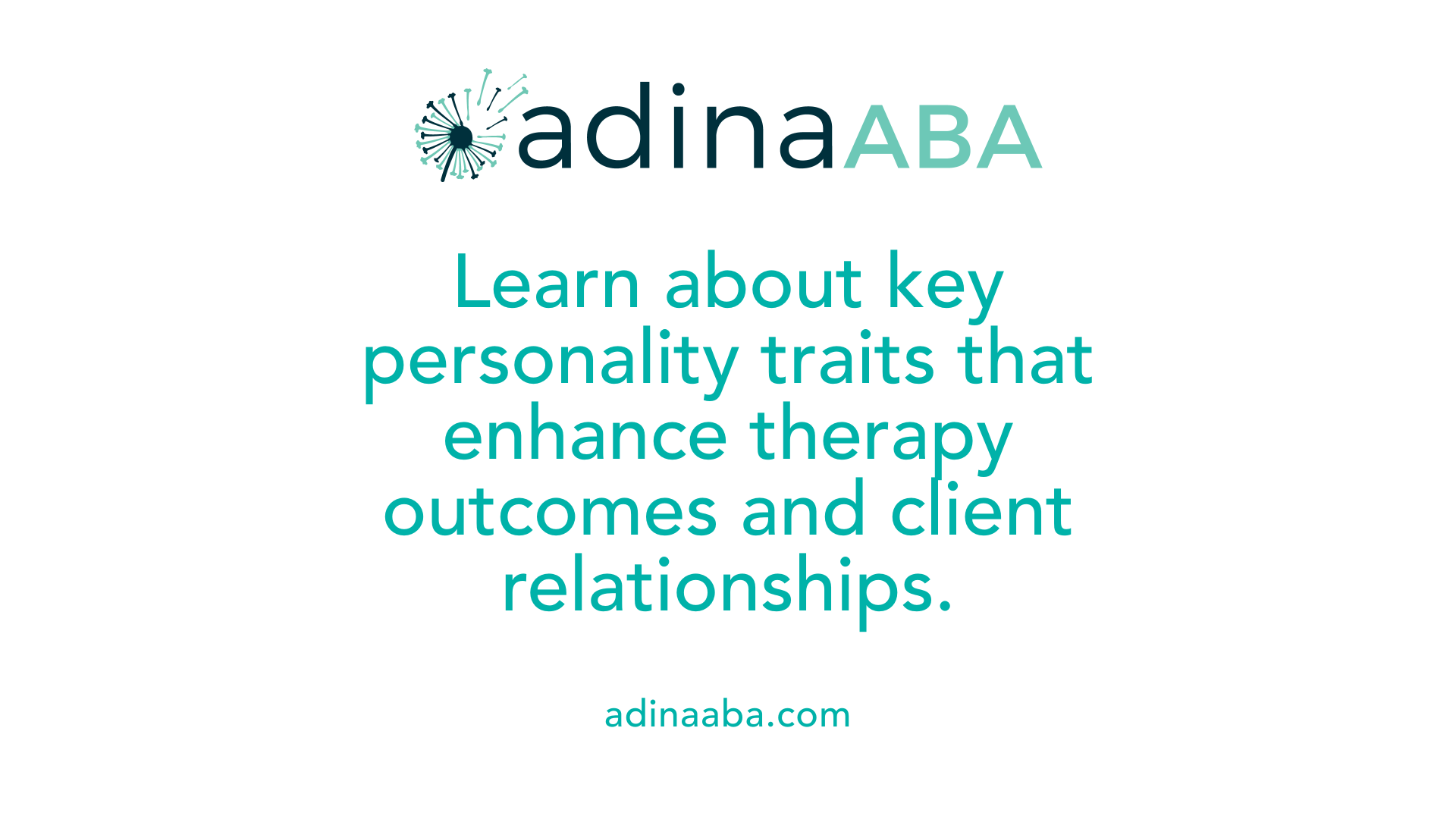What makes a good ABA therapist

Understanding the Essentials of Effective ABA Therapy
Applied Behavior Analysis (ABA) is a scientifically supported approach used to improve behaviors and skills in individuals with autism spectrum disorder (ASD). A key factor in its success lies in the qualities and qualifications of the therapists delivering it. This article explores what makes a good ABA therapist—covering the personal traits, educational background, skills, and professional standards vital for high-quality care—and provides guidance on selecting and developing into an effective ABA professional.
Core Qualities and Personal Traits of a Good ABA Therapist

What qualities and personal traits are essential for an effective ABA therapist?
A successful ABA therapist embodies a range of personal qualities that facilitate effective treatment. Patience and empathy are at the forefront, enabling therapists to understand and share in the feelings of children with ASD while maintaining professional boundaries. This compassionate approach helps build trust and rapport, which are crucial for a child's willingness to engage.
Active listening and interpreting non-verbal cues are equally important. Many children with ASD communicate through body language, facial expressions, and other non-verbal signals. Therapists skilled in active listening can identify patterns and triggers of behaviors, allowing for more personalized interventions.
Creativity and adaptability are essential traits. Since each child's needs are unique, therapists must develop innovative communication methods and be flexible enough to modify strategies as progress is made or new challenges arise. Their capacity for critical thinking supports the ongoing design and refinement of individualized treatment plans.
A genuine passion for the field and curiosity about why behaviors occur drive therapists to stay informed about current research and new techniques. This continual professional curiosity facilitates evidence-based practices and helps in customizing approaches.
Professionalism, reliability, and adherence to ethical standards underpin the therapeutic relationship. Qualified therapists often hold certifications from recognized bodies like the BACB, with high levels of training and supervised experience. Their commitment to data collection, analysis, and ongoing education ensures the delivery of high-quality, consistent support.
In summary, an effective ABA therapist combines patience, empathy, active listening, creativity, a love for learning, and professionalism. These qualities foster a nurturing environment where children feel safe, understood, and motivated to develop essential skills.
Educational Background and Training Pathways

What qualifications, education, and training are necessary to become an ABA therapist?
Becoming a qualified ABA therapist involves a combination of formal education, specialized coursework, supervised practical experience, and certification.
Most professionals in the field hold at least a bachelor's degree in psychology, education, or related fields. However, to reach higher levels like a Board Certified Behavior Analyst (BCBA), a master's degree in psychology, behavior analysis, or special education is often required. These advanced degrees should be from programs accredited by recognized bodies such as the Association for Behavior Analysis International (ABAI).
In addition to academic degrees, coursework focusing on ethics, behavior assessment, behavior change procedures, and supervision is essential. This coursework can be completed through verified course sequences approved by the BACB or regionally accredited institutions.
Supervised experience is another vital component. Trainees usually need about 1,500 to 2,000 hours of fieldwork that involves direct hands-on activities such as data collection, conducting assessments, creating intervention plans, and staff training.
Certification procedures include passing the BCBA exam, which is administered by Pearson VUE, an online testing service. Candidates must also fulfill continuing education requirements to maintain their certification, ensuring they stay updated with the latest evidence-based practices.
For paraprofossos, the Registered Behavior Technician (RBT) credential requires at least a high school diploma, completion of specific training, and passing an exam. Alternatively, a bachelor’s or master’s degree opens pathways toward becoming a BCaBA or BCBA, respectively.
Overall, the pathway to becoming an ABA therapist emphasizes comprehensive education, validated coursework, hands-on supervised practice, and ongoing professional development through recertification.
| Degree Level | Typical Requirements | Additional Certifications | Objectives |
|---|---|---|---|
| High School or GED | Basic training for RBT | RBT certificate | Direct support and implementation |
| Bachelor’s Degree | Coursework in psychology/education | BCaBA certification | Designing and implementing interventions |
| Master’s Degree | In-depth ABA coursework, supervised fieldwork | BCBA certification | Developing treatment plans, supervising staff |
| Doctoral Degree | Advanced research and clinical skills | Optional for clinical leader roles | Leading research, advanced therapy design |
Staying current with continuing education is crucial for maintaining licensure and certification in this dynamic field.
Essential Skills and Competencies for ABA Practitioners
What skills and competencies are essential for ABA practitioners?
Effective ABA therapists require a well-rounded skill set that combines technical knowledge with soft skills. At the core, they must excel in observation and active listening to identify behavior patterns and triggers, which guides tailored interventions. Developing strong communication skills and rapport-building abilities helps foster trusting relationships with children and their families, essential for successful therapy.
Data collection and thorough analysis form the backbone of evidence-based practice. Therapists must accurately record behaviors, progress, and setbacks, then interpret this data to adapt strategies accordingly. Accuracy and attention to detail are imperative to ensure the reliability of these data-driven decisions.
Critical thinking allows practitioners to design and modify treatment plans dynamically, ensuring they address individual needs and evolving challenges. Creativity plays a role in devising innovative communication and intervention methods that motivate clients and make learning engaging.
In addition, a comprehensive understanding of ABA principles—such as positive reinforcement, prompting, fading, and functional behavior assessment—is fundamental. Proper training, certification (like BCBA or RBT credentials), and adherence to ethical guidelines are necessary to uphold professional standards.
Cultural competence and adaptability enable therapists to serve diverse populations effectively. Being sensitive to different backgrounds and flexible in approaches ensures inclusive and respectful services.
Finally, a client-centered approach that emphasizes ethical practice, empathy, patience, and professionalism supports a positive therapy environment. These combined competencies empower ABA practitioners to facilitate meaningful behavioral improvements and support the overall well-being of their clients.
Choosing a Qualified and Ethical ABA Therapist

How can I identify a qualified ABA therapist?
Selecting a skilled ABA therapist is essential for effective treatment. First, verify their credentials through the Behavior Analyst Certification Board (BACB). A qualified professional should hold a BCBA (Board Certified Behavior Analyst), BCaBA (Board Certified Assistant Behavior Analyst), or RBT (Registered Behavior Technician) certificate.
Experience is equally important. Look for practitioners with a proven track record in working with individuals with autism spectrum disorder (ASD) and applying behavioral interventions. Good therapists have at least three years of experience treating children with ASD and demonstrate ongoing professional development.
Supervision practices also matter. Effective programs are overseen by licensed BCBAs, who supervise less experienced therapists like RBTs and BCaBAs. Reputable organizations prioritize supervision, ensuring that interventions are evidence-based and ethical.
Transparency and a data-driven approach are hallmarks of quality care. Ask potential providers about how they monitor progress through data collection, analysis, and regular assessments.
Furthermore, ethical standards are crucial. A good therapist respects client dignity, avoids punishment, and employs positive reinforcement strategies. Checking their reputation and confirming compliance with state licensing requirements adds additional assurance.
Family involvement is vital. An ideal therapist communicates clearly with parents, incorporates their insights, and provides guidance for ongoing support at home.
Ultimately, asking detailed questions about their training, experience, supervision, and treatment philosophy will help you find a qualified professional dedicated to your child's growth and well-being.
Selecting the Right ABA Provider: What to Consider
What should be considered when selecting an ABA therapist?
Choosing an appropriate ABA therapist involves multiple important factors. First, verify their credentials—look for certifications like BCBA (Board Certified Behavior Analyst) or BCaBA from the Behavior Analyst Certification Board (BACB). These credentials indicate advanced training and adherence to professional standards.
Experience is also critical. Preferably, the therapist should have several years of working directly with children with autism, especially those with similar challenges. This experience ensures they are familiar with effective treatment protocols and can adapt strategies to individual needs.
Equally important is the approach to treatment planning. An effective therapist develops personalized plans based on the child’s unique behaviors, goals, and circumstances. They should employ evidence-based practices, utilizing data collection and analysis to monitor progress and make necessary adjustments.
A strong relationship between the therapist and family fosters trust and open communication. The therapist should be engaging, patient, and capable of explaining strategies clearly to caregivers. Family involvement is integral, so providers who actively include and educate parents or caregivers tend to deliver better outcomes.
Cultural competence and respect for family routines are crucial. The provider should demonstrate sensitivity to cultural differences and tailor interventions accordingly.
Lastly, research the provider’s reputation and adherence to ethical practices. High-quality services often involve ongoing assessment, continuous staff training, transparency about progress, and a commitment to families’ involvement.
In summary, selecting a provider with proper credentials, extensive experience, a collaborative approach, and a focus on data-driven, personalized care ensures effective and respectful treatment for children with ASD.
Core Principles and Ethical Dimensions of ABA
What are the core principles and dimensions of ABA?
The practice of Applied Behavior Analysis (ABA) is guided by seven fundamental principles that ensure its effectiveness and ethical application. These principles are: Applied, Behavioral, Analytic, Technological, Conceptually Systematic, Effective, and Generality.
Applied means that ABA focuses on behaviors that are socially significant and improve the quality of life for the individual. Behavioral ensures that interventions target observable and measurable actions. Analytic emphasizes establishing a clear, demonstrable connection between the intervention and behavior change, demonstrating a functional relationship.
Technological involves describing procedures in a detailed and precise manner so that others can replicate the interventions accurately. Conceptually Systematic signifies that interventions are grounded in behavioral principles and theory, maintaining consistency with scientific foundations. Effectiveness ensures that the changes produced are meaningful, durable, and generalize across settings and over time. Lastly, Generality refers to achieving behavioral improvements that last beyond the immediate context and are applicable in various environments.
Together, these seven dimensions serve as a framework for delivering ABA that is ethical, reliable, and rooted in scientific evidence. They help therapists craft interventions that are not only effective but also respectful and aligned with client rights, including the use of positive reinforcement over punishment. Collaboration with families and other professionals is integral to maintaining treatment fidelity and ensuring that each plan caters to the individual’s unique needs.
Furthermore, data collection and ongoing assessment are central to ABA practice, informing adjustments to treatment and verifying progress. This evidence-based, systematic approach fosters trust, promotes meaningful outcomes, and upholds the highest ethical standards in therapy.
For more detailed exploration, search terms like "Principles and ethics of ABA practice" can provide additional insights into this vital field.
Personality Traits That Foster Effective Therapy

What is the personality traits of an effective ABA therapist?
An excellent ABA therapist embodies several important personality qualities that make their work impactful and compassionate. Empathy is fundamental; it allows therapists to genuinely understand and resonate with a child's feelings, creating a trusting and supportive environment.
Patience and emotional maturity are crucial for managing challenging behaviors calmly and consistently. These traits help therapists stay composed and focused, even during difficult moments, ensuring that interventions remain positive and effective.
Creativity and flexibility enable therapists to develop innovative strategies tailored to each child's unique needs. They can adapt ways of teaching communication or coping skills, making therapy engaging and relevant.
Engagement, enthusiasm, and approachability help in building a strong rapport with children. When therapists are cheerful and approachable, children are more likely to participate actively, which enhances learning.
Professionalism and adherence to ethical standards are vital. This includes reliability, respectful collaboration with families and colleagues, and a commitment to ongoing learning.
Resilience and self-care are also important traits. Effective therapists maintain their well-being to prevent burnout, ensuring sustained support for their clients.
Altogether, these personality qualities foster a safe, motivating, and effective therapy environment—crucial for meaningful progress in children with autism.
| Trait | Description | Impact on Therapy |
|---|---|---|
| Empathy | Understanding and sharing clients' feelings | Builds trust and rapport |
| Patience | Calmly managing behaviors and therapy pace | Ensures consistency and reduces frustration |
| Creativity | Developing innovative interventions | Keeps therapy engaging and personalized |
| Approachability | Being friendly and open | Promotes active participation from children |
| Professionalism | Ethical, reliable, and collaborative | Fosters a respectful and productive environment |
| Resilience | Staying strong mentally and emotionally | Supports long-term therapy success |
This combination of personality traits underpins an ABA therapist's ability to deliver high-quality, compassionate care and adapt to each child's unique journey.
Career Development and Ongoing Professional Growth

Are there career development opportunities for aspiring ABA therapists?
Absolutely, there are numerous pathways for growth within the field of ABA. Entry-level roles often start with obtaining foundational certifications such as the Registered Behavior Technician (RBT), which requires specific training and passing an exam. From there, individuals can pursue higher credentials like the Behavior Analyst Certification Board (BACB) certified BCaBA (Board Certified Assistant Behavior Analyst) or BCBA (Board Certified Behavior Analyst). These certifications require advanced education, supervised fieldwork, and passing rigorous exams.
Career advancement can include roles such as behavior analyst, program supervisor, clinical director, or research specialist. Many professionals also choose to specialize further by engaging in advanced coursework or obtaining additional certifications in areas like organizational behavior management or specific populations. These opportunities often lead to higher salaries, leadership positions, and increased influence in shaping treatment approaches.
Beyond clinical work, experienced ABA practitioners can branch into related fields including education, sports coaching, animal training, or social work, leveraging their skills in behavior analysis. Moreover, engaging in research and contributing to evidence-based practices can open doors to academic and policy development roles.
Continual learning, certifications, and professional development are essential for growth. Many organizations and universities offer workshops, conferences, and continuing education units (CEUs), helping ABA professionals stay current with cutting-edge research and innovative techniques. This ongoing education ensures practitioners can provide the best possible support and expand their careers in diverse and impactful ways.
In summary, the field of ABA offers dynamic career development options, from clinical practice to leadership and research, supported by education, certification, and experience. These opportunities allow professionals to elevate their expertise and influence the future of behavioral therapy.
Empowering the Future of ABA Therapy
The effectiveness of ABA therapy hinges on the qualities, qualifications, and ongoing professional development of its practitioners. By embodying empathy, creativity, and professionalism, and adhering to evidence-based practices and ethical standards, ABA therapists can profoundly impact the lives of individuals with autism. Aspiring professionals should pursue comprehensive education, certification, and supervised experience to excel in the field. With dedication to continuous learning and adaptation, ABA therapists can grow their careers and help shape a future where all individuals have the opportunity to reach their full potential.
References
- Skills, Abilities & Personality Traits of a Good Behavior Therapist | NU
- How to Know If You're Getting Good ABA - Child Mind Institute
- What to Look For When Choosing an ABA Therapist
- What to Consider When You're Choosing an ABA Therapist
- Questions to ask an ABA therapist | Autism Speaks
- What Makes A Good ABA Therapist? - Bluesprig Autism
- 7 Great Reasons to Become an ABA Therapist | Post University
- What Skills Benefit ABA Therapists: Success in Autism Treatment
- Applied Behavior Analysis (ABA) | Autism Speaks
More Resources
Expert Clinicians
Get started today ->



.jpg)


